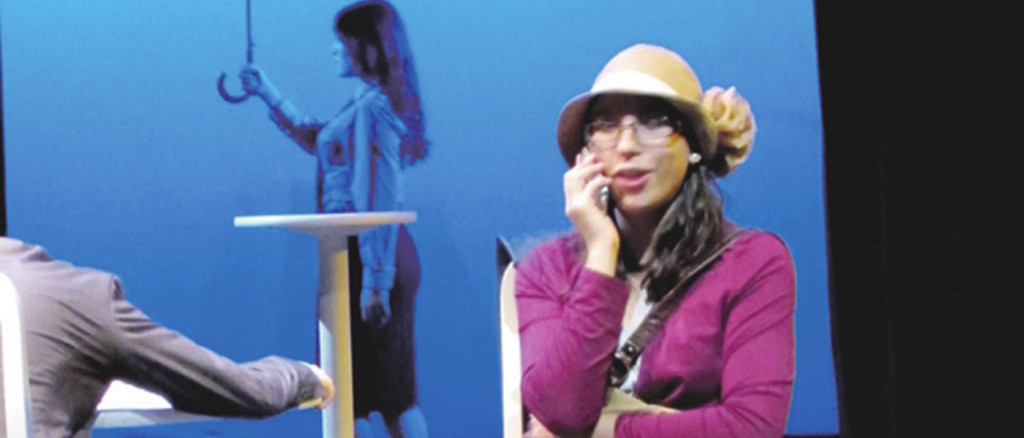In one of the better lines in Sarah Ruhl’s surreal comedy Dead Man’s Cell Phone, the mother of the deceased proclaims at his funeral, “You’ll never walk alone. That’s right, because you’ll always have a machine in your pants that might ring.”
Within the action of the play, performed by the Boot and Buskin theater group at Le Moyne College’s Coyne Center for the Performing Arts, cell phones are scripted to go off repeatedly on cue, and, just as in life, they interrupt the flow of dialogue and distract us. So which conversation will take precedence: the human one we’re in or the electronic one that demands to be heard? The electronic one takes us into the unknown, especially when we’ve purloined it from someone else.
We first see the phone-lifter Jean (Natasia White) as a misfit in a dance sequence choreographed by Ruth Arena. Director Matt Chiorini and set designer Karel Blakeley have opted to put Dead Man on a stage so bare you can see the taped blocking markers on the floor. Projected images of sterile technology appear on a screen upstage, and our ears are boxed with thunderous electronic syncopation. The six-person ensemble, all sleek in black and white, glide by gracefully as straw-hatted Jean stumbles in, shod in heavy boots and wearing all the wrong colors. She eats alone in a restaurant, oblivious to others, savoring her soup: lobster bisque. She lifts up the bowl to slurp down the last drop without a spoon.
A ringing cell phone interrupts her repose. When the man at the table behind with his back to her keeps ignoring it, she gently asks him to attend to the matter. She asks if he’s deaf and signs him in ASL. He then slumps forward, stone cold, and she decides to stop the noise herself: “Hello? No, he’s not here. Can I take a message?” Perhaps because she’s an employee of the Holocaust Museum (the play opened in Washington, D.C., in 2007), Jean decides to keep the man, who is named Gordon, alive in a vicarious way. (Don’t ask if many of us would do this.) She will answer his calls, always with cheerful and reassuring messages. This way she learns about his family members and plans for his funeral. But even when word of Gordon’s death has got out, the of them sinister. His ultimate enterprise seems to be morally toxic, and Jean’s holding of the phone makes her the subject of threats, one from an exotically accented Mystery Woman (Taylor Bigelow).
Jean decides to attend Gordon’s funeral, where her prevarications about her relationship are steadily mounting. The deceased’s family maintained a frosty relationship with him before the end. His imperious mother, Mrs. Gottlieb (Jessie Gherardi), complains that her son had not been returning her calls, but Jean offers that Gordon had tried to reach her in his last hours and that her number was on his outgoing calls list. She has comparably sweet fabrications for the estranged widow, Hermia (Kayla Graham), and a somewhat infantile and lonely younger brother Dwight (Ryan Bannen). Jean also believes her untruth. She slips into a church to tell God that “I think I Ioved him, in a way.”
The first act splits uneasily into two parts, the intellectual and the emotional. Not only are the first 15 minutes the most fun, but Mrs. Gottlieb’s request for Rodgers and Hammerstein’s “You’ll Never Walk Alone” prompts both her aforementioned riposte, but also the beginnings of Ruhl’s argument in the play. Does the presence of the cell phone signal the holder’s absence? Gentle, selfless Jean does not have a cell phone. She admits that as a mousy, lonely person she likes to disappear, but if we all had our cell phone, wouldn’t we all disappear? In the playbill, two pages of program notes by Shimi Cohen address the “Innovation of Loneliness.”
In the six years since the play opened, Jean’s conundrum has intensified. Now that phones are smarter and can do much of what a desktop computer could do 10 years ago, the phone holder might not only be talking to somebody more interesting than you are but he or she might be checking a stock report or an old movie title on IMDb.
As we reel from the implications of how profoundly cell phones may be changing us, it’s hard to keep track of the emotional threads. Worse, Ruhl’s dialogue suffers an attack of the cutes, in which she has Jean bring Gordon’s family little gifts from the restaurant where he died: a salt shaker, a knife and a spoon. The long scene turns lugubrious, phone keeps getting messages, some and director Chiorini can’t save it.
The play glides into a science-fiction mode in the second act when Gordon comes back from the dead and we learn the nature of his dirty business. It would be a spoiler to give it away, but Ruhl must have been influenced by Annie Cheney’s Body Brokers, published just before Dead Man appeared. Gordon’s defense of his life has all the lighthearted bravado of Orson Welles’ vindication of totalitarianism in The Third Man.
Natasia White so completely fills the character of Jean that we forget she is about half the required age. She flows with the quixotic earnestness amid absurdity found in other Ruhl characters. White invests her with so much goodness she all but refutes Ruhl’s fears. With such a character we know we are being heard.



